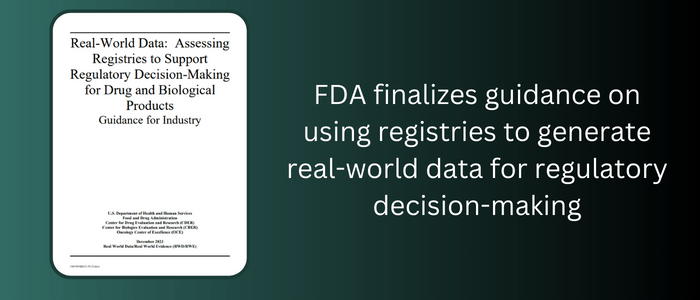FDA finalizes guidance on using registries to generate real-world data for regulatory decision-making

The US FDA has released its finalized guidance for industry titled “Real-World Data: Assessing Registries to Support Regulatory Decision-Making for Drug and Biological Products.” Published on December 22, 2023, this guidance is part of the FDA’s Real-World Evidence (RWE) Program, fulfilling the Federal Food, Drug, and Cosmetic Act’s mandate under section 505F to provide guidance on using RWE for regulatory decisions. It provides insights for sponsors proposing to design or use a registry to inform decisions about a drug’s effectiveness or safety.
Building upon the draft guidance of the same title issued on November 30, 2021, the guidance emphasizes key responsibilities for sponsors utilizing registry data. One notable change is that sponsors are now required to ensure the collection of relevant and reliable data from registries, regardless of their origin – “Sponsors submitting data to FDA from registries held by another organization should work closely with that organization to ensure that processes and procedures are in place to support the reliability of the registry data.” The FDA also emphasizes the importance of sponsors having access to the metadata associated with the registry data, in order to support regulatory decision-making.
View our infographic timeline of recent FDA draft and final guidance:
Infographic: Milestones in the FDA’s Real-World Evidence activities
The guidance covers several crucial aspects, including:
- Fitness-for-Use: Focusing on a registry’s suitability for regulatory decision-making, the guidance underscores attributes that ensure the collection of relevant and reliable data.
- Linking to Other Data Sources: Considerations are provided when linking a registry to other data sources, including medical claims, electronic health records, digital health technologies, or other registries.
- FDA Review of Submissions: The guidance outlines factors that the FDA considers when reviewing submissions containing registry data.
Additional considerations covered in the guidance include the selection, description, verification, and validation of registries for use in clinical investigations. It also addresses the use of registry data for trial endpoints, risk identification, data retention, and protection, along with delineating roles and responsibilities for sponsors and investigators.
Registries, ranging from basic clinical information in quality assurance registries to detailed, longitudinal data in research-focused ones, offer valuable insights for interventional and observational studies across drug development stages. They aid in illustrating the natural progression of diseases, influencing clinical trial designs by specifying participant criteria, outcome measures, and required sample sizes. Registries contribute to identifying biomarkers associated with clinical outcomes, facilitating study planning, and assessing real-world drug effects in underrepresented populations.
Before utilizing registry data to support FDA regulatory decisions, sponsors must assess the data’s fitness-for-use, considering relevance and reliability. Key factors include the registry’s disease focus, completeness of comorbidity information, and participant representativeness, all of which are critical for preventing potential bias in analyses. Additionally, plans to minimize missing assessments and participant dropout are imperative for maintaining data quality and meeting FDA standards for regulatory decision-making.
Notable changes from the 2021 draft guidance also include the removal of examples of pregnancy-related information that may be collected by a registry, as this is addressed in separate guidance, while terms that may be defined differently by various stakeholders were omitted if unnecessary for understanding the guidance.
This guidance aligns with the FDA’s commitment to the use of real-world evidence in regulatory decision-making, complying with the 21st Century Cures Act and the Prescription Drug User Fee Amendments of 2017. It aims to provide clarity and structure for researchers integrating registries into regulatory submissions, emphasizing the FDA’s dedication to advancing data collection and analysis for more informed and efficient regulatory decision-making in drug and biologic product development.
Want regular updates on the latest real-world evidence news straight to your inbox? Become a member on The Evidence Base® today>>>





